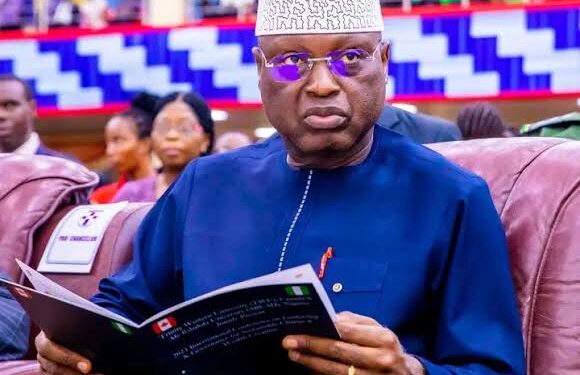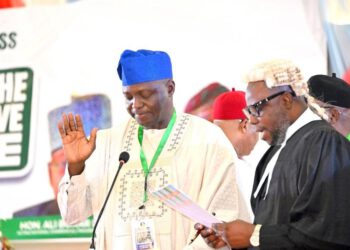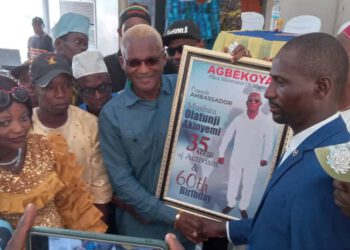By Mary Oso – Omotosho
Give it to Governor Biodun Abayomi Oyebanji (BAO) of Ekiti State. He has emerged as a shiny example of a leader who truly believes in grassroots democracy and governance. His recent decision to conduct council elections within the short span of his tenure, within a year, shows his unwavering commitment to empowering the people and bringing development closer to the grassroots.
In the neighbouring states such as Ondo, Osun, Ogun, and Oyo, the lack of political will to hold council elections has led to a disconnect between the local government and the people they serve. In fact, Ondo State has just sacked the caretaker chairmen, thus creating a hoopla within the system.
It Is a known fact that the absence of elected representatives at the grassroots level hampers effective decision-making and inhibits the participation of citizens in shaping their own communities. Currently, it is on the record that only Ekiti and Lagos States have a running elective Local Government administration in the entire south western part of the federation!
However, Governor Oyebanji, unlike his counterparts, recognizes the importance of revitalizing the local government system. The council election conducted in Ekiti, recently, was a testament to his belief in the power of grassroots governance. By allowing multiple parties to participate and ensuring a well-managed process with no violence recorded anywhere, he has provided an opportunity for the people to choose their own leaders, ensuring that their voices count and their expectations were met.
This bold step taken by Governor Oyebanji not only demonstrates his trust in the ability of the people to make informed choices, but also reflects his vision of a democratic society, built on the principles of inclusivity and genuine participation. By bringing the government closer to the people, he has created an avenue for effective representation, active community involvement, and accountable local administration.
The governor’s dedication to grassroots democracy goes beyond mere rhetorics. He recognizes that the real transformation happens at the local level, where the immediate needs and aspirations of the people reside. Through this commitment, he has laid a solid foundation for sustainable development and progress in Ekiti State.
The impact of Governor Oyebanji’s belief in grassroots governance is already evident in the various developmental projects and initiatives across the state. By empowering the local governments and involving the citizens in decision-making processes, Oyebanji ensures that developmental efforts align with the actual needs of the people. This approach bolsters social cohesion, fosters a sense of ownership, and creates an enabling environment for sustainable development across all sectors of society.
Indeed, BAO’s reign is a testament to the power and potential of grassroots democracy, which, when nurtured and prioritized, has the capacity to transform societies from the ground up.
Under his leadership, the impact of grassroots democracy is far-reaching. The local government system, which was once seen as a mere administrative structure, now plays a pivotal role in driving change and development in Ekiti State. The governor’s emphasis on representation, accountability, and community involvement has paved the way for a more inclusive and participatory governance model.
Through his belief in grassroots governance, Governor Oyebanji has successfully decentralized decision-making processes, ensuring that the needs of the people are given top priority. By directly involving elected representatives from the local governments and his non interference with the councils administration,he has created a channel for direct communication between the government and the grassroots, eliminating unnecessary bureaucratic barriers.
Furthermore, the governor’s commitment to grassroot democracy has instilled a sense of ownership and responsibility among the citizens. People now feel empowered to actively participate in local affairs and contribute to the development of their communities. This increased engagement fosters a sense of pride and belonging, as individuals see their voices being heard and their contributions making a tangible difference.
The governor’s belief in grassroots democracy also extends to fostering collaboration and partnerships among various stakeholders. He recognizes that a strong partnership between the government, civil society organizations, and the private sector is crucial for sustainable development. By involving these key actors in decision-making processes, Governor Oyebanji has created a united front in advancing the interests and well-being of the people.
Governor Oyebanji’s administration stands as a shiny example, not just within Ekiti State, but also across the nation. His belief in grassroots democracy and governance has ignited a spark of progress and inclusivity that is inspiring other leaders and communities to follow suit. By prioritizing the voices and needs of the people, he has established a solid foundation for sustainable development, social harmony, and effective governance.
As his administration continues to unfold, it is clear that Governor Oyebanji’s commitment to grassroots democracy and governance will drive positive change in Ekiti State. By embracing the local government system as a vehicle for progress, he is not only inspiring other leaders but also empowering communities to take charge of their own destiny.
As BAO continues his tenure, it is evident that his commitment to grassroots democracy and governance will remain steadfast. The principles he upholds will continue to shape policy decisions, empower communities, and strengthen the bonds between the government and the people. In this way, Ekiti State serves as a shiny example of the transformative potential of grassroots democracy and the immense impact it can have on society as a whole.





















